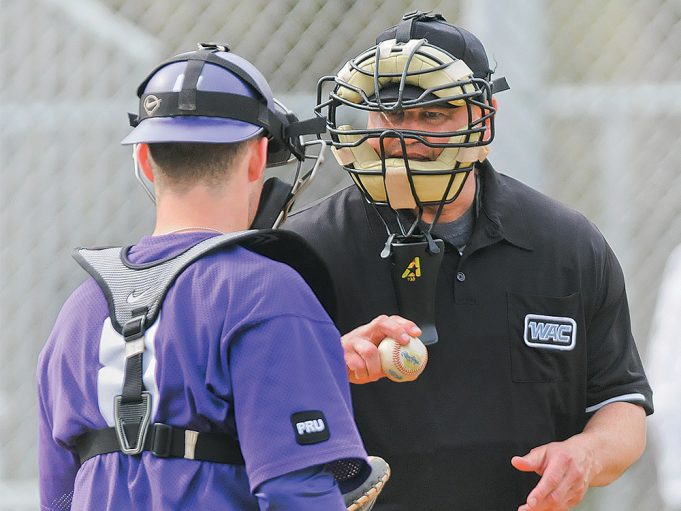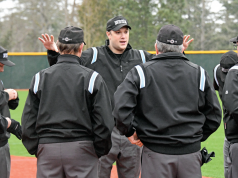A long-standing topic of debate in baseball circles is how we should relate to catchers. There are several schools of thought.
I’ve heard some umpires say they work hard to build a relationship because catchers will try harder to protect them if they’re on good terms. This has even included having a smaller zone on catchers when they’re at bat. Other umpires aren’t concerned about protection but still talk catchers’ ears off from the first pitch to the last. A few are at the other end of the spectrum: They barely say a word during a game. Some lay down the law at the start with a sermon like, “We need to work together, so don’t pull pitches or turn around if you disagree with a call.”
I was in the second group early in my career. I didn’t fear being protected and didn’t cut them slack when they were hitting, but I did talk too much. I was nearly their age and had just finished playing so there were many on- and off-field things to talk about and I wasn’t shy about doing so. I don’t think I consciously thought about being their friend but I acted that way, never thinking about whether I was distracting them or one might sell me down the river. But in my first year of pro ball (1970) one did just that. It got back to me that after a game he went on and on about how I missed pitches and the game-ending call at the plate because I had been so busy BS-ing for 10 innings that I didn’t pay attention to what I was doing. This stung, and it caused me to reassess my approach. I reached two conclusions.
For starters, although I had heard this said, it finally sunk in that umpires shouldn’t try to be buddies with players. There are inherent barriers between us and it needs to stay that way. I’m not sure how much they respect us if we’re too chummy. And, as in my case, they can be lovey-dovey to our faces but knife us in the back when they get away from us. So, my first conclusion was that I had erred by not keeping some boundaries in place.
I also realized that their personalities are different. Some are gregarious while others are basically shy. Some are more easily distracted than others. Their maturity level may differ. My personality might mesh with catcher X but not Y. Plus, they’re a captive audience. What do we expect them to do if they don’t want to engage in a talkfest? Say, “Hey, would you please shut up”? Not likely. So my second conclusion was that I had erred in being Chatty Cathy with all of them. Some will be fine with that, maybe even welcome it; others won’t.
What to do? I didn’t want to be a robot devoid of personality because I thought that may be as off-putting as being too talkative. I didn’t like the lay-down-the-law approach for I thought that starts things off on an antagonistic note. I’d rather assume they know how to behave until they prove otherwise. In my career, most did; only a few were jerks. Finally, I knew that creating some rapport with that person two feet in front of me is necessary or it can be a long day behind the plate; it’s a matter of not going overboard.
So I charted a middle course — be amiable and share a comment or quip here and there but keep interaction minimal and on a professional level. That way I wouldn’t be distracting or as open to a cheap-shot attack and the variables in our dynamics wouldn’t matter.
I said hi when they came out in the first inning, asked their first name if I didn’t know it, and shook their hand if they stuck theirs out. I’d ask if their pitcher threw anything unusual so I wouldn’t be caught off-guard. That’s about it.
I took some warmup pitches behind them in the first inning. I thought this conveyed the message that I didn’t think I was so good that I could just start calling pitches cold. Plus, it gave me some feel for how they set up, received the ball, etc.
If they asked where a pitch was, I’d say down or whatever, but I didn’t engage in debate. If they wanted to pursue the matter, I’d say nothing or, “That’s what I had, so let’s move on.” Sometimes I had to get firm and tell them to knock off the complaining — maybe even dust off the plate (ostensibly) so I could stress the need to zip it up without anyone knowing what was going on — but those occasions were rare.
If I knew I had missed the pitch, I wouldn’t flat out say that because some will throw it back in your face. Instead, I finessed it with something like, “I’d like to see that one again.” They got the message, and I thought this was better than coming across like I think I’m perfect. But I only did this if I knew I had kicked the crap out of the call, and I never did it if the catcher was a jerk.
I took my cues from them as far as conversation was concerned. If they wanted to talk, I’d oblige to a point, but usually I replied to comments rather than initiating them. If they wanted to keep to themselves, fine. I kept my language clean and avoided personalities and gossip. All in all, if I had more than four or five exchanges with each catcher in a game, it was a talkative day for me.
I’m not going to say my way is the only way, but it worked well for me. I think catchers appreciated that I had some interaction with them, but kept it limited and on a professional plane and that they respected me more than if I had tried to act like “one of the guys.” And I know from my years as a supervisor that many coaches think we talk with their players too much and that it’s distracting to them and us, so I’ve no doubt that my less-is-more approach also went down well with them.
What's Your Call? Leave a Comment:
Note: This article is archival in nature. Rules, interpretations, mechanics, philosophies and other information may or may not be correct for the current year.
This article is the copyright of ©Referee Enterprises, Inc., and may not be republished in whole or in part online, in print or in any capacity without expressed written permission from Referee. The article is made available for educational use by individuals.


















